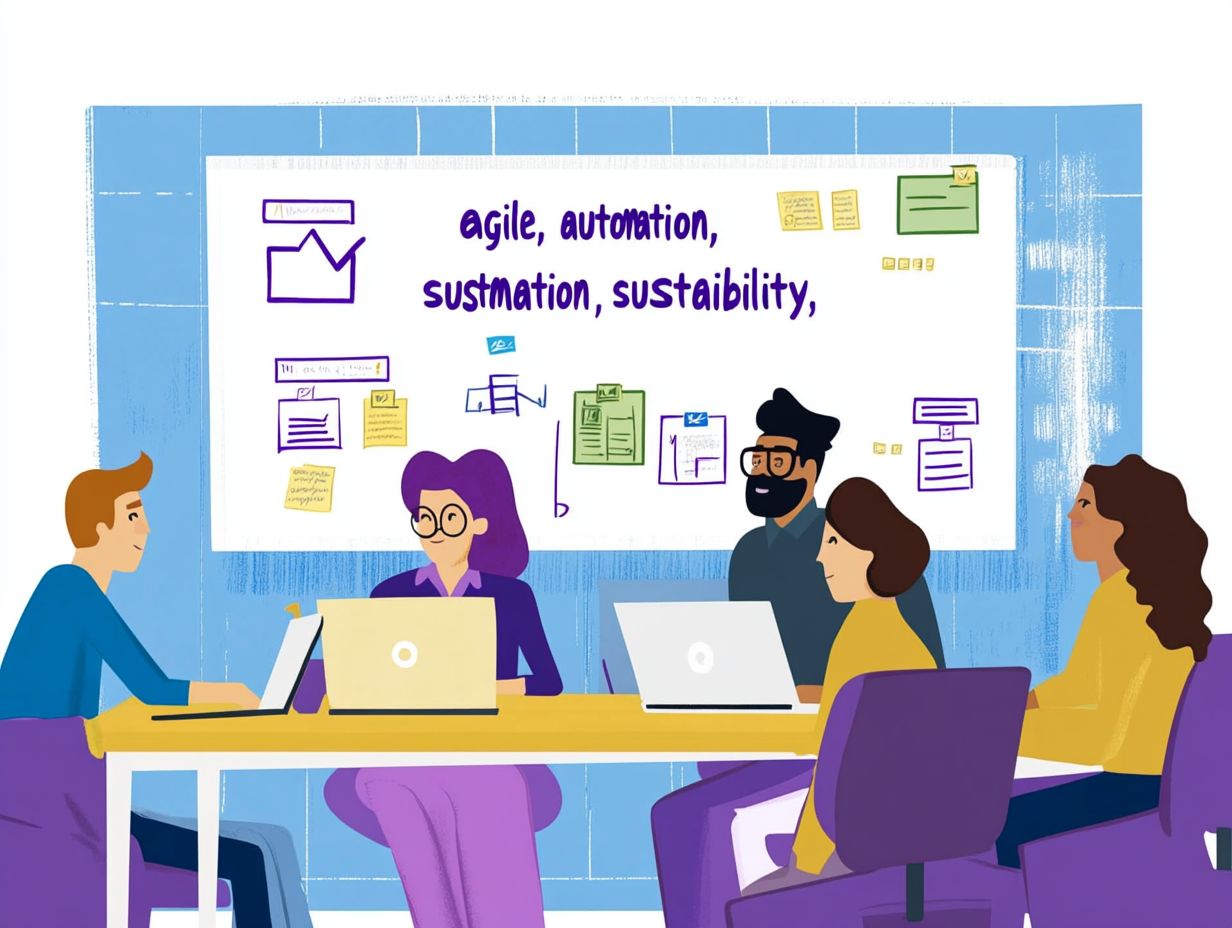10 trends in project management for 2024
Get ready for a project management revolution in 2024! As you step into the new year, you’ll notice the landscape of project management evolving at an impressive pace. With cutting-edge technologies and a heightened focus on sustainability, it’s essential for you to adapt in order to remain competitive.
This article delves into ten key trends shaping the future of project management, including the shift toward remote work, the integration of agile methodologies, and the rising significance of soft skills.
Explore how these changes will influence your projects and uncover strategies to thrive in this dynamic environment.
Contents
- Key Takeaways:
- 1. Harness AI and Automation for Project Success!
- 2. Emphasis on Agile Project Management
- 3. Remote Project Management Now Defines How We Work
- 4. Focus on Sustainability and Environmental Impact
- 5. Integration of Project Management with Business Strategy
- 6. Importance of Soft Skills for Project Managers
- 7. Growth of Project Management Software and Tools
- 8. Inclusion of Diversity and Inclusivity in Project Teams
- 9. Shift towards Outcome-Based Project Management
- 10. Increased Demand for Project Management Professionals
- How Will These Trends Shape the Future of Project Management?
- What Are the Potential Challenges in Implementing These Trends?
- How Can Project Managers Stay Ahead of These Trends?
- What Are the Benefits of Adopting These Trends in Project Management?
- What Are the Key Factors for Successful Project Management in 2024?
- How Can Organizations Prepare for These Changes in Project Management?
- Frequently Asked Questions
- What are the top 10 trends in project management for 2024?
- How will remote project management impact the future of project management in 2024?
- What role will automation and AI play in project management in 2024?
- How will sustainability initiatives impact project management in 2024?
- What are the benefits of cross-functional and diverse teams in project management for 2024?
- How will agile project management evolve in 2024?
Key Takeaways:

Artificial intelligence and automation will play a crucial role in streamlining project management processes and increasing efficiency.
Agile project management will continue to be a dominant approach, allowing for flexibility and adaptability in rapidly changing environments.
Remote project management will become the new norm, requiring effective communication and collaboration tools along with strong leadership skills.
1. Harness AI and Automation for Project Success!
The rise of artificial intelligence (AI) and automation tools in project management is reshaping how you approach your projects. These technologies enhance your success rates and streamline processes remarkably.
With AI technologies, including advanced software solutions, you’re equipped with improved data analytics that empower you to make informed decisions based on performance insights and real-time updates.
Automation optimizes your task management and fosters better communication with stakeholders, ultimately enhancing project delivery.
Industry leaders like Gartner recognize the value of automated workflows in reducing manual tasks. This enables you to concentrate on strategic planning and risk assessment.
Tools like Trello and Monday.com incorporate AI-driven features that help prioritize tasks and identify potential bottlenecks.
The Project Management Institute highlights how predictive analytics can foresee project hurdles. This allows for proactive intervention to mitigate risks.
These advancements promote a proactive approach to project oversight, paving the way for healthier timelines and significantly diminishing the chances of project failure.
2. Emphasis on Agile Project Management
The focus on agile project management signifies a transformative shift toward greater flexibility and responsiveness in project delivery. This approach enables you to navigate change management more adeptly and enhance communication with stakeholders through collaborative tools.
Adopting this innovative methodology fosters a culture of continuous improvement and adaptability within your team. It encourages open dialogue and collective problem-solving.
By utilizing frameworks like Scrum and Kanban, you can effectively prioritize tasks and swiftly adjust to shifting requirements. These methodologies streamline your workflow and ensure that your projects align seamlessly with organizational strategy, enhancing overall effectiveness.
The iterative nature of agile practices allows you to regularly reflect on processes, leading to the ongoing evolution of methods that better meet client expectations and business objectives.
3. Remote Project Management Now Defines How We Work
Remote project management is now the standard in today s workforce. It’s essential for you to embrace workplace flexibility and hybrid working models that ensure effective communication and collaboration with your dispersed teams.
This shift boosts productivity and expands the array of tools at your disposal for seamless interaction.
Think mobile apps that facilitate instant messaging and video conferencing your lifeline in a remote landscape. Cloud-based solutions, like project management software, allow you and your team members access to real-time updates and share files from virtually anywhere.
Hybrid working environments foster a healthier work-life balance, leading to increased employee engagement and improved mental well-being. By adopting these strategies, you contribute to creating an adaptable work culture where everyone feels valued and connected, no matter where they are.
Call to Action: Embrace these trends in your projects and explore how they can elevate your project management strategies!
4. Focus on Sustainability and Environmental Impact
A growing emphasis on sustainability and environmental impact in project management is prompting you to embrace practices that not only benefit the planet but also resonate with community needs and organizational objectives.
This shift highlights the necessity of weaving eco-friendly methodologies into every phase of the project life cycle, from the initial planning stages right through to execution and closure.
By integrating sustainability, you can enhance resource efficiency, minimize waste, and encourage the use of renewable materials, thereby nurturing a sense of responsibility among your team members.
Aligning these practices with your organization’s strategic vision not only ensures compliance with regulations and industry standards but also cultivates improved trust and satisfaction among stakeholders.
When sustainability is woven into the strategic framework, it becomes a powerful ally in risk management and creates opportunities for innovation and long-term cost savings.
5. Integration of Project Management with Business Strategy
Integrating project management with broader business strategy has become essential for you to ensure that your projects align seamlessly with organizational objectives. This alignment not only drives strategic initiatives but also enhances the monitoring and delivery of overall performance.
By embracing this approach, you contribute meaningfully to the organization’s overarching goals while cultivating a culture of accountability and transparency.
You can leverage performance insights to identify emerging trends and pivot your strategies with agility, ensuring that your projects are not just successful but also relevant to the ever-evolving needs of the business.
Using tools like Balanced Scorecards, which help track performance against strategic goals, or software such as Asana and Trello can really boost this integration. These resources offer valuable metrics and real-time data that empower you to make informed decisions.
Ultimately, this alignment leads to improved resource allocation and heightened stakeholder satisfaction.
6. Importance of Soft Skills for Project Managers

The significance of soft skills, particularly emotional intelligence and leadership abilities, has become increasingly clear for you as a project manager. These skills help build cohesive teams and boost employee engagement throughout the project lifecycle.
With these competencies at your disposal, you can navigate interpersonal dynamics effectively, ensuring that your team feels valued.
For instance, effective communication on your part can prevent misunderstandings that often crop up in collaborative settings, while strong leadership can inspire unity and motivation within your team.
Participating in training programs like Emotional Intelligence workshops and Leadership Development courses equips you with practical tools to enhance your interpersonal interactions.
By focusing on scenarios that demand negotiation and conflict resolution, these programs help you develop a skill set that not only improves project outcomes but also nurtures a positive work culture.
7. Growth of Project Management Software and Tools
The rise of project management software and tools like Asana, Trello, and Microsoft Project is transforming how you manage tasks and empowering you to gain valuable performance insights while effectively managing resources.
These powerful platforms are here to supercharge your workflows and boost collaboration! With features such as real-time updates, customizable dashboards, and automated task assignments at your fingertips, you can optimize your team’s performance effortlessly.
Take Asana, for example. It allows you to visualize your team’s progress through timelines and Kanban boards, making it a breeze to adjust priorities when the need arises.
Then there’s Trello, which, thanks to its intuitive interface, promotes seamless communication among your team members with comment sections and notifications, creating a more engaged and dynamic work environment.
On the other hand, Microsoft Project offers comprehensive reporting tools that enable you to track budgets and timelines with remarkable precision. Collectively, these innovative tools significantly enhance project delivery, ensuring that all stakeholders stay informed and engaged throughout the project lifecycle.
8. Inclusion of Diversity and Inclusivity in Project Teams
The inclusion of diversity and inclusivity in your project teams is crucial for enhancing team dynamics and reaping community benefits, ultimately leading to improved employee engagement and innovative problem-solving.
When you gather individuals from various backgrounds on a project team, you unlock a treasure trove of perspectives and ideas. This multicultural collaboration sparks creativity, enabling you to tackle challenges with unique solutions that might remain hidden in a more homogenous group.
By implementing best practices like fostering open dialogue, ensuring equal opportunities for participation, and embracing diverse viewpoints you create an environment where everyone feels valued.
As a result, not only does team morale soar, but the quality and effectiveness of your project outcomes often exceed those of less diverse teams.
9. Shift towards Outcome-Based Project Management
The shift towards outcome-based project management invites you to embrace results-driven strategies that prioritize performance monitoring and effective project delivery in alignment with your strategic initiatives.
This methodology encourages you to set clear, measurable objectives that guide every phase of your project. By defining these targets from the outset, you can direct your focus towards achieving specific outcomes rather than simply ticking off tasks.
Key Performance Indicators, or KPIs, which are measurable values that show how effectively a company is achieving its key business objectives, become essential metrics within this framework. These indicators assist in evaluating whether your project remains aligned with its intended goals and can highlight areas that may require adjustment.
This focus on tangible results fosters accountability among your team and significantly boosts the success rate of your projects.
10. Increased Demand for Project Management Professionals
The rising demand for project management professionals highlights the growing recognition of the critical role effective project delivery and change management play in today s business landscape.
Organizations are eager to find skilled project managers who can effectively manage time and resources while inspiring teams to reach strategic goals.
This shift highlights the importance of versatile skills like managing risks, engaging stakeholders, and using agile methods.
Stay competitive by pursuing continuous education and certification today, especially from esteemed organizations like the Project Management Institute.
These credentials not only bolster your expertise but also showcase your commitment to best practices an increasingly vital asset in today s fast-paced job market.
How Will These Trends Shape the Future of Project Management?
It s vital to understand how current trends like technology and soft skills will shape project management’s future. Doing so will help you succeed and manage change effectively.
As organizations strive to navigate an increasingly complex and fast-paced environment, your ability to leverage these trends will be pivotal. Embracing innovation means not just using new tools but also being flexible and open to change.
You ll need to enhance your skills in collaboration and emotional intelligence, creating an atmosphere where your team members feel empowered to share their ideas. This approach will lead to projects that not only meet timelines and budgets but also align with stakeholder expectations.
The fusion of technology and interpersonal skills will be critical, making the future of project management a dynamic interplay of both technical and human elements.
What Are the Potential Challenges in Implementing These Trends?

Implementing the latest trends in project management brings unique challenges. You’ll face resistance to change, hurdles in technology adoption, and ongoing training needs.
These issues can intensify when team members are used to traditional methodologies. This often leads to hesitance in embracing innovative practices. Integration challenges may occur as you try to blend new tools with existing processes, creating extra roadblocks.
Foster an open dialogue within your team. Encourage everyone to voice their concerns and share experiences with new technologies. Offering hands-on training sessions can facilitate a smoother transition, helping your staff feel more at ease with new tools and workflows. This ultimately enhances project success.
How Can Project Managers Stay Ahead of These Trends?
To stay ahead of the ever-evolving trends in project management, commit to continuous learning through specialized training programs and networking with industry professionals.
This proactive approach boosts your skills and opens exciting new opportunities.
Pursuing relevant certifications can be particularly advantageous, as these credentials align with the latest industry practices and technologies.
Joining professional organizations like the Project Management Institute grants you access to valuable resources, webinars, and a vast network of peers.
Engaging in community discussions and attending conferences allows you to gain insights that ignite innovation, giving you a competitive edge in managing projects effectively.
What Are the Benefits of Adopting These Trends in Project Management?
Adopting the latest trends in project management offers several benefits:
- Enhanced project success
- Improved stakeholder communication
- Boost in employee engagement
By integrating innovative methods like Agile (a flexible approach to project management) and Scrum (a way to work in small, efficient teams), you can shorten project cycles and increase flexibility. For example, a software development company that implemented Agile practices saw a 30% reduction in project delivery times.
Utilizing collaborative tools fosters transparent communication and makes it easy for stakeholders to provide real-time feedback. This proactive approach bridges gaps and cultivates a sense of ownership among employees, driving up both motivation and productivity.
Ultimately, embracing modern strategies creates a robust project environment that nurtures creativity and collaboration, setting your organization up for success.
What Are the Key Factors for Successful Project Management in 2024?
Successful project management in 2024 will depend on several key factors, particularly your ability to integrate technological advancements and leverage the top 5 project management analytics tools while building important teamwork skills in your team.
Your capacity to adapt quickly to changing circumstances will be critical as you navigate dynamic environments. Effective communication ensures that all stakeholders remain aligned and informed throughout the project lifecycle.
By leveraging innovative tools and methodologies, you can streamline processes, enhance collaboration, and ultimately drive successful project outcomes. Focusing on these elements will not only help your team meet its objectives but also exceed expectations, establishing a benchmark for future projects and fostering a culture of continuous improvement.
How Can Organizations Prepare for These Changes in Project Management?
Organizations need to get ahead of changes in project management by aligning their organizational strategy with evolving trends and investing in employee engagement and training.
To achieve this, leaders should first assess their current project management processes, pinpointing areas that require improvement.
By fostering a culture that welcomes change, leadership can inspire teams to be more adaptable and receptive to new methodologies. Regular communication about the benefits of these changes reinforces team buy-in, making transitions smoother.
Targeted training equips employees with the essential skills to thrive in a dynamic environment, ultimately cultivating a more resilient and innovative workforce that can adeptly navigate both challenges and opportunities.
Frequently Asked Questions
What are the top 10 trends in project management for 2024?
Here’s a visual representation of the top trends:

The top 10 trends in project management for 2024 are: remote project management, increased use of automation and AI, focus on project resilience and risk management, sustainability initiatives, cross-functional and diverse teams, agile project management, project-based learning and development, customer-centric project management, virtual and augmented reality in project planning and execution, and the rise of gig project managers.
How will remote project management impact the future of project management in 2024?
Remote project management is rapidly becoming essential! Project managers will need to adapt to managing teams and projects remotely, leveraging technology and communication tools to ensure project success.
What role will automation and AI play in project management in 2024?
Automation and AI will become more prevalent in project management in 2024, streamlining processes, improving efficiency, and freeing up project managers to focus on more strategic tasks. This will also lead to the creation of new roles, such as project automation specialists.
How will sustainability initiatives impact project management in 2024?
Sustainability will become a key consideration in project management in 2024, with organizations focusing on implementing sustainable practices and reducing their environmental impact. This will require project managers to integrate sustainability into project planning and execution.
What are the benefits of cross-functional and diverse teams in project management for 2024?
Cross-functional and diverse teams bring a variety of perspectives and skills to project management, leading to better problem-solving, creativity, and overall project success. In 2024, organizations will increasingly prioritize diversity and inclusivity in their project teams.
How will agile project management evolve in 2024?
Agile project management will continue to evolve in 2024, with organizations adopting agile methodologies beyond just software development projects. This will require project managers to become well-versed in agile practices and techniques to keep up with the changing landscape.
Stay updated on these trends to ensure your organization thrives in the ever-evolving project management landscape!






